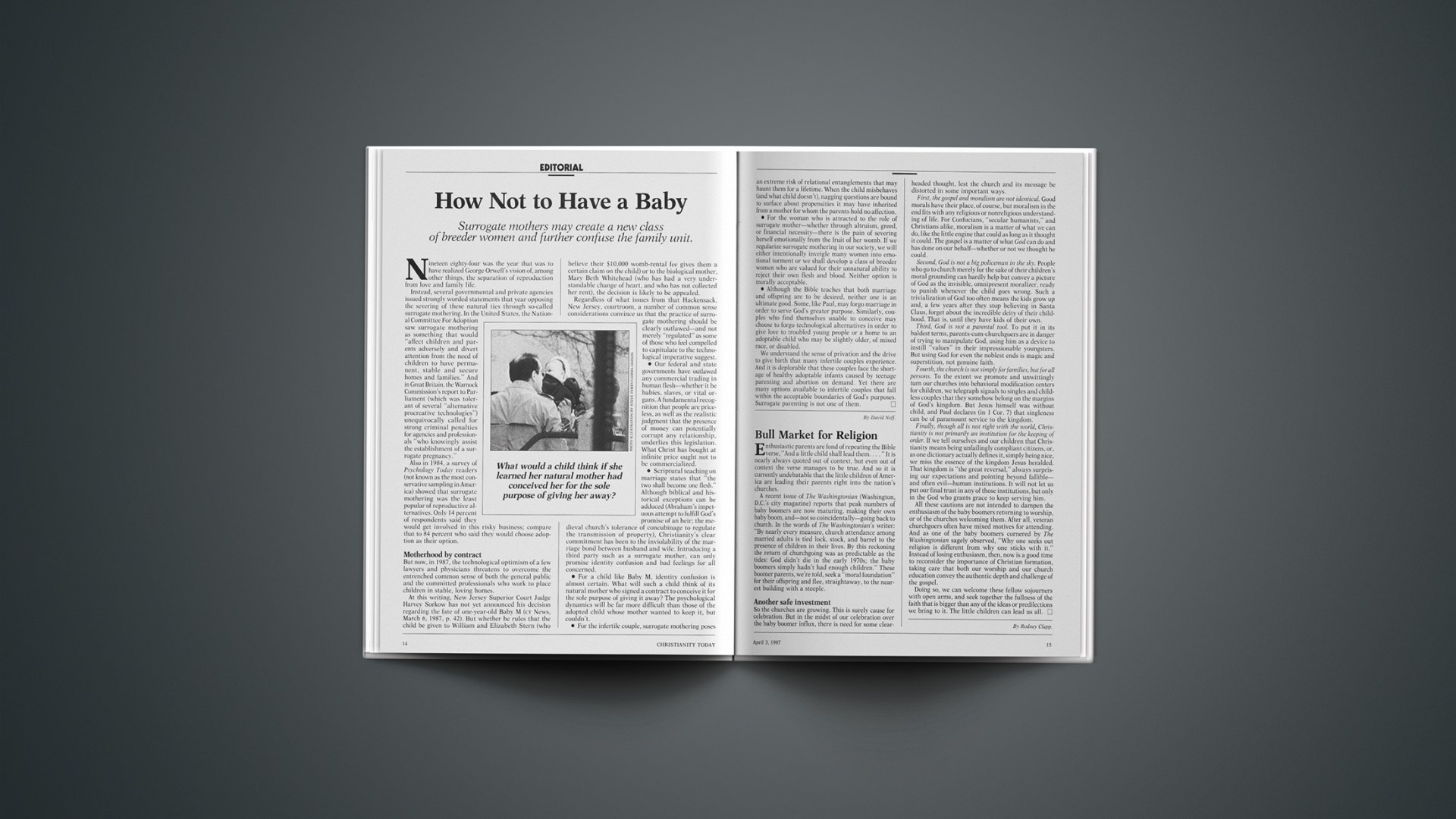Nineteen eighty-four was the year that was to have realized George Orwell’s vision of, among other things, the separation of reproduction from love and family life.
Instead, several governmental and private agencies issued strongly worded statements that year opposing the severing of these natural ties through so-called surrogate mothering. In the United States, the National Committee For Adoption saw surrogate mothering as something that would “affect children and parents adversely and divert attention from the need of children to have permanent, stable and secure homes and families.” And in Great Britain, the Warnock Commission’s report to Parliament (which was tolerant of several “alternative procreative technologies”) unequivocally called for strong criminal penalties for agencies and professionals “who knowingly assist the establishment of a surrogate pregnancy.”
Also in 1984, a survey of Psychology Today readers (not known as the most conservative sampling in America) showed that surrogate mothering was the least popular of reproductive alternatives. Only 14 percent of respondents said they would get involved in this risky business; compare that to 84 percent who said they would choose adoption as their option.
Motherhood By Contract
But now, in 1987, the technological optimism of a few lawyers and physicians threatens to overcome the entrenched common sense of both the general public and the committed professionals who work to place children in stable, loving homes.
At this writing, New Jersey Superior Court Judge Harvey Sorkow has not yet announced his decision regarding the fate of one-year-old Baby M (CT News, March 6, 1987, p. 42). But whether he rules that the child be given to William and Elizabeth Stern (who believe their $10,000 womb-rental fee gives them a certain claim on the child) or to the biological mother, Mary Beth Whitehead (who has had a very understandable change of heart, and who has not collected her rent), the decision is likely to be appealed.
Regardless of what issues from that Hackensack, New Jersey, courtroom, a number of common sense considerations convince us that the practice of surrogate mothering should be clearly outlawed—and not merely “regulated” as some of those who feel compelled to capitulate to the technological imperative suggest.
- Our federal and state governments have outlawed any commercial trading in human flesh—whether it be babies, slaves, or vital organs. A fundamental recognition that people are priceless, as well as the realistic judgment that the presence of money can potentially corrupt any relationship, underlies this legislation. What Christ has bought at infinite price ought not to be commercialized.
- Scriptural teaching on marriage states that “the two shall become one flesh.” Although biblical and historical exceptions can be adduced (Abraham’s impetuous attempt to fulfill God’s promise of an heir; the medieval church’s tolerance of concubinage to regulate the transmission of property), Christianity’s clear commitment has been to the inviolability of the marriage bond between husband and wife. Introducing a third party such as a surrogate mother, can only promise identity confusion and bad feelings for all concerned.
- For a child like Baby M, identity confusion is almost certain. What will such a child think of its natural mother who signed a contract to conceive it for the sole purpose of giving it away? The psychological dynamics will be far more difficult than those of the adopted child whose mother wanted to keep it, but couldn’t.
- For the infertile couple, surrogate mothering poses an extreme risk of relational entanglements that may haunt them for a lifetime. When the child misbehaves (and what child doesn’t), nagging questions are bound to surface about propensities it may have inherited from a mother for whom the parents hold no affection.
- For the woman who is attracted to the role of surrogate mother—whether through altruism, greed, or financial necessity—there is the pain of severing herself emotionally from the fruit of her womb. If we regularize surrogate mothering in our society, we will either intentionally inveigle many women into emotional torment or we shall develop a class of breeder women who are valued for their unnatural ability to reject their own flesh and blood. Neither option is morally acceptable.
- Although the Bible teaches that both marriage and offspring are to be desired, neither one is an ultimate good. Some, like Paul, may forgo marriage in order to serve God’s greater purpose. Similarly, couples who find themselves unable to conceive may choose to forgo technological alternatives in order to give love to troubled young people or a home to an adoptable child who may be slightly older, of mixed race, or disabled.
We understand the sense of privation and the drive to give birth that many infertile couples experience. And it is deplorable that these couples face the shortage of healthy adoptable infants caused by teenage parenting and abortion on demand. Yet there are many options available to infertile couples that fall within the acceptable boundaries of God’s purposes. Surrogate parenting is not one of them.
By David Neff










